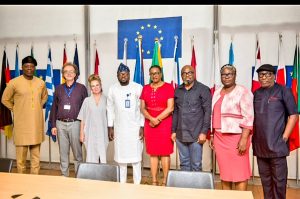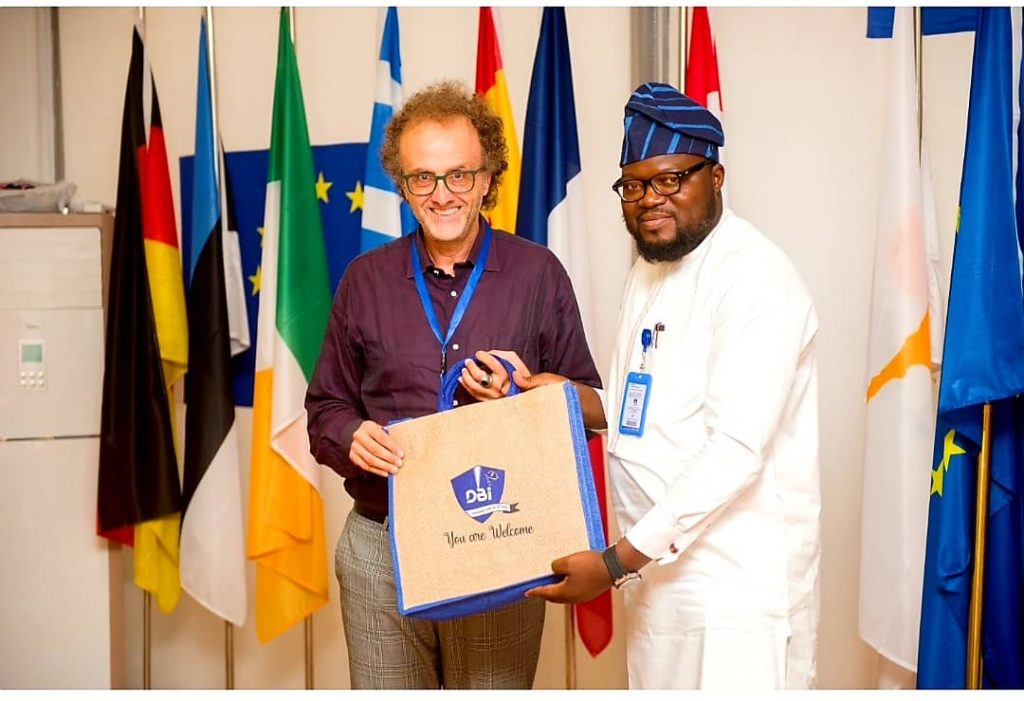Lawrence Nwimo, Awka
The Digital Bridge Institute (DBI), an organisation that focuses on digital literacy, and the European Union have strengthened ties to enhance digital transformation and capacity building initiatives in Nigeria.
Ikengaonline learnt that the move is to enhance international collaboration in digital transformation and technology transfer. It is also to leverage expertise and resources to address growing demand for digital skills and innovation in the global workforce.
 Chief Executive Officer of DBI, David Daser, accompanied by key officials of the Institute, Thursday paid a courtesy visit to the European Union (EU) delegation in Abuja.
Chief Executive Officer of DBI, David Daser, accompanied by key officials of the Institute, Thursday paid a courtesy visit to the European Union (EU) delegation in Abuja.
The delegation was warmly received by the EU representatives to Nigeria and ECOWAS, including Massimo De Luca, Head of Cooperation, Inga Stefanowicz, Head of Section for Green and Digital Economy, and Frank Okafor, Project Manager in the Economic Cooperation and Energy Section.
During the meeting, Massimo De Luca expressed the EU’s commitment to fostering partnerships that support digital transformation and human capital development in Nigeria. Both parties discussed ongoing and future initiatives aimed at advancing digital literacy, promoting technological advancements, and empowering youth through skills training.
David Daser highlighted DBI’s continued efforts in capacity building through the Advanced Digital Empowerment Programme for Tertiary Institutions (ADEPTI), a project fully funded by the Nigerian Communications Commission (NCC) under the leadership of the Executive Vice Chairman, Dr. Aminu Maida. He mentioned that the ADEPTI initiative has trained over 120,000 staff members across tertiary institutions in Nigeria.
Daser also noted that DBI operates multi-campus centers with residential facilities in Abuja, Lagos, Kano, Yola, Enugu, and Asaba, providing cutting-edge skills development and enhancement. However, he pointed out that the Enugu and Asaba campuses are not yet fully operational.
Additionally, Daser emphasised DBI’s alignment with the Ministry of Communications and Digital Economy, led by the Honourable Minister Dr. Bosun Tijani, whose ministry is executing the 3MTT programme, among other initiatives.
He highlighted DBI’s recent successes in training professionals and government officials across the digital ecosystem, noting how these efforts contribute to Nigeria’s digital economy agenda, in line with President Bola Tinubu’s Renewed Hope Agenda.
“We are delighted to explore opportunities for collaboration with the European Union. Together, we can create a more inclusive digital landscape, improve connectivity, and equip Nigerians with the skills needed to compete globally,” Daser reiterated.
Furthermore, Daser discussed DBI’s National Innovation Diploma (NID) programme, which offers a 70:30 blend of hands-on practical training and theoretical concepts tailored to meet industry, occupational, and entrepreneurial requirements. He expressed DBI’s hope to leverage the EU’s international reach.
In response, Massimo De Luca reaffirmed the EU’s readiness to support Nigeria’s digital growth, stressing the role of education and technology in achieving sustainable development goals.
The discussions also explored future projects, including joint research initiatives, the expansion of digital infrastructure, e-governance, and exchange programmes between the EU and DBI.

